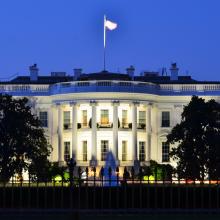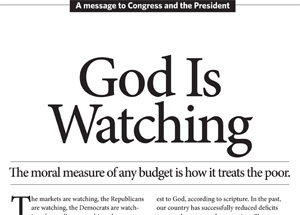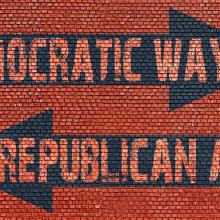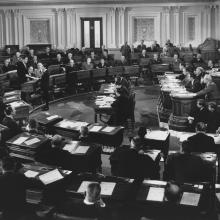bipartisan

Image via Heidi Besen/Shutterstock.com
I’m grateful for the 10 governors — Republican and Democrat — who wrote to senators asking them to reject the so-called “skinny repeal” because of how it would affect their residents.
I’m grateful for the thousands of you who heeded Sojourners’ call and contacted your member of Congress to voice your opposition to any bill that would hurt the poor with devastating cuts to Medicaid.

Image via Orhan Cam / Shutterstock.com
Newly released documents from the Department of Justice reveal that despite calling itself the most transparent administration in history, the Obama administration worked behind the scenes to block bipartisan transparency reform. The documents, themselves obtained by a Freedom of Information Act request, show that the administration intervened to sink legislation that would make it easier for the public to access information through FOIA.
The phenomenon of “creeping normality” allows for significant changes to be deemed acceptable when they occur gradually over time, in relatively unnoticed increments, rather than single steps or dramatic and noticeable instances. The “boiling frog” metaphor, which illustrates the familiar account of an unassuming amphibian that is slowly and successfully cooked to death, reveals not only how such instances can occur, but also how a calculated and protracted alteration (produced by those with power to turn up the heat) can possess disastrous results if not noticed and properly countered (by those left in the water). We need not look far for modern-day examples.
Extreme partisanship has crept into our political normality. As revealed last year by the Pew Research Center, our civic temperature is methodically rising, perhaps beyond the boiling point. The study states:
“The overall share of Americans who express consistently conservative or consistently liberal opinions has doubled over the past two decades from 10% to 21%. [As a result], the center has gotten smaller: 39% of Americans currently take a roughly equal number of liberal and conservative positions, down from 49% in surveys conducted in 1994 and 2004.”
The debate about immigration reform has been very productive in America over these past several years. And that debate has been won — by those who favor a common sense agenda for reform.
Two out of every three Americans now favor fixing our broken immigration system — two out of three! According to a recent report by the Public Religion Research Institute, 65 percent of Americans say that the U.S. immigration system is either completely or mostly broken. That same report found that 63 percent of Americans favor immigration reform that creates a pathway to citizenship, crossing party and religious lines. 60 percent of Republicans, 57 percent of independents, and 73 percent of Democrats favor a pathway to citizenship.
However, a minority of lawmakers — almost all white legislators in artificially gerrymandered white Congressional districts — is blocking a democratic vote on immigration reform. The Senate has already passed a bipartisan bill to reform the immigration system; written and forged by an impressive coalition of Republican and Democratic Senate leaders. And if a similar bill was put to a vote in the House of Representatives, it would also pass.
After a decades-long standoff, Iran and the West (plus China and Russia) have signed an interim agreement to halt Iran’s nuclear program in exchange for modest sanctions relief. While some are calling it a historic breakthrough along the lines of Nixon’s visit to China, the U.S. media has been mostly skeptical. And in a rare display of bipartisanship, Congress is already looking for ways to derail the deal by passing legislation to impose new sanctions on Iran and tie the President’s hands for future negotiations. Despite the fact that President Obama has successfully passed tougher sanctions on Iran than any previous administration, the U.S. media in lockstep with Congress continue to thumb their noses at anything that resembles diplomacy when it comes to Iran. And while other U.S. allies in the region — primarily the Gulf States led by Saudi Arabia — have expressed their concerns over this deal, few Americans care about what the Saudis think. As representatives of the American people, what Congress really cares about is what Israel thinks.
That’s where things get dicey.
Politics at its best serves the common good — far above any one interest or political party. And right now in Washington, we see that playing out as we continue to reach accord on immigration reform. But when it comes to our budget debate, partisan ideology and special interests are winning out over the common good.
The ever-looming “sequester” that was never supposed to happen goes into effect tomorrow. Billions of dollars will be cut from domestic and military spending without any plan or strategy; jobs will be lost and people will suffer. Public frustration is growing with our elected officials, while they continue to argue over the role of government instead of governing responsibly. The press discusses who wins and loses in the polls, but it is clear that it is the common good that is losing.
On the other hand, immigration reform is being discussed, at the same time with the same political players, in a very reasonable and hopeful way. On that important policy change, bipartisan work is going forward to shape legislation that could pass both houses of Congress.
By 2015, we could have an AIDS free generation.
AIDS was first identified nearly 30 years ago and has claimed countless lives. Currently, 1,000 babies around the globe are born with the virus each day. During much of the past few decades it’s been hard to see much hope when it comes to turning the tide against this disease.
But, thanks to smart public health decisions, public investment in strategies that work, and innovative implementation by NGO’s, we can now begin to envision a day when this mountain will be moved. During FY 2011 PEPFAR, (The President’s Emergency Plan for AIDs Relief) supported the prevention of 200,000 children contracting HIV/AIDS from their mother.
With continued investment we are just a few years away from preventing nearly ALL children from being born with the virus.
On Monday the Dow Jones industrial average fell 634.76 points; the sixth-worst point decline for the Dow in the last 112 years and the worst drop since December 2008. Every stock in the Standard and Poor's 500 index declined.
It is easy to blame bipartisan bickering for the impasse that led to Standard and Poor's downgrading of the American debt, and in turn the vertiginous fall of the Dow. This bickering -- this substitution of ideology for reason, of egotism for compassion and responsibility on the part of lawmakers -- is a national disgrace; but while it failed to fix the problem, we must realize that it did not cause it. The cause -- and potential for a significant renewal -- lies much deeper.
So let's allow ourselves to ask a fundamental question: what's an economy for?
When I first visited Ethiopia at the height of the 1984 famine, I watched as twenty-four people died of starvation in less than fifteen minutes, right in front of my eyes. Barely five years into my career as a Congressman, nothing my staff told me beforehand could have prepared me for what I saw on that trip.
Gasping at awful photographs of unspeakable human suffering is one thing; bearing firsthand witness to human suffering is another thing entirely. Glancing at a picture of a starving child in the newspaper, you can always turn away, but when you're staring into the eyes of a mother who has just lost that child, it's a completely different story. There's no looking the other way.
That's why I often describe those first Ethiopia experiences as my "converting ground" on issues of global hunger. What happened in Ethiopia changed me, and changed how an entire generation looks at hunger.
It's also why I'm currently back on the Horn of Africa, reporting on the ground from the Dadaab refugee camp in eastern Kenya, less than fifty miles from the Somali border. And I am appealing to my affluent brothers and sisters in the United Stated and around the world not to look away. We need your help.
 The markets are watching, the Republicans are watching, the Democrats are watching, the media are watching, the pollsters and pundits are watching. The public is watching and is disgusted with Washington, D.C.
The markets are watching, the Republicans are watching, the Democrats are watching, the media are watching, the pollsters and pundits are watching. The public is watching and is disgusted with Washington, D.C.
When it comes to the bitter and ultra-partisan battles over the budget, the deficit, and the fast-approaching deadline for America defaulting on its financial commitments, the whole nation and even the world is watching.
But God is watching too.
Today is another intense day of politics at the White House. The debt default deadline is fast approaching. The stakes for the nation are high as politicians can't agree on how to resolve the ideological impasse on how to reduce the deficit before the nation defaults on its financial obligations.
Yesterday, before Congressional leaders were due at the White House for critical negotiations, I, along with 11 other national faith leaders, met with President Obama and senior White House staff for 40 minutes. We were representing the Circle of Protection, which formed in a commitment to defend the poor in the budget debates. Sitting in the Roosevelt Room of the White House, we opened in prayer, grasping hands across the table, and read scripture together. We reminded ourselves that people of faith must evaluate big decisions on issues like a budget by how they impact the most vulnerable.
Last evening, President Obama made his long-awaited announcement on beginning withdrawal of the 103,000 U.S. troops from Afghanistan.
The extreme budget cuts proposed to critical programs that save the lives, dignity, and future of poor and vulnerable people have crossed the line.
Yesterday, a group of more than 130 former legislators, both Republicans and Democrats, released a letter urging for civility and encouraging candidates, once elected, to focus on cooperation to face our country's greatest challenges. The letter said:




